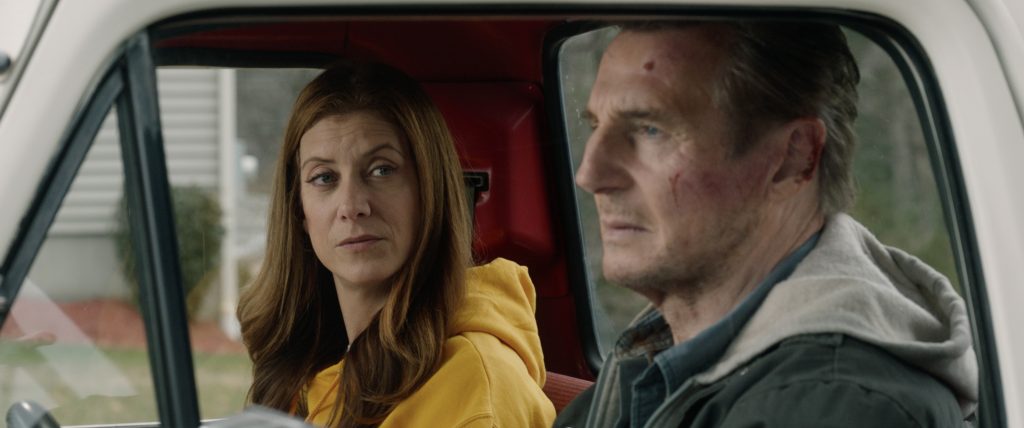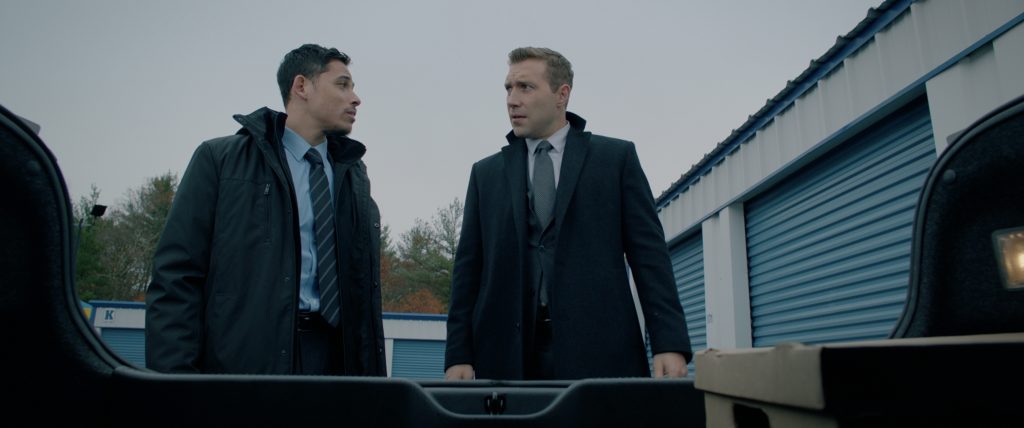October 17, 2020
by Carla Hay

Directed by Mark Williams
Culture Representation: Taking place in the Boston area, the action-crime thriller “Honest Thief” has a predominantly white cast (with a few Latinos and African Americans) representing the middle-class.
Culture Clash: A notorious bank robber battles with FBI agents when he decides to turn himself into authorities.
Culture Audience: “Honest Thief” will appeal primarily to people who don’t mind watching predictable thrillers that have a lot of credibility issues.

If there’s an action drama with Liam Nesson as the star, then you can bet that his character in the movie is out for revenge. The problem is that Neeson has made so many of these types of “revenge movies” that they all blend together after a while, except for the “Taken” franchise which is its own separate beast. Therefore, it’s understandable if viewers really can’t tell one Neeson pulpy thriller from the next one. At least with “Honest Thief,” the title is a reminder of what type of character Neeson portrays in the movie. The film’s title might be distinctive, but the movie’s mediocre plot and action definitely are as generic and unimaginative as they can be.
In “Honest Thief” (directed by Mark Williams), Neeson plays Tom Dolan, also known as Tom Carter, a notorious bank robber whose modus operandi is to set off explosives to open a safe in a bank while the bank is closed for business. (Tom lives in the Boston area, and Neeson keeps his native Irish accent for this role.) Tom always chooses banks with older safes (which are easier to open) and which are located next to vacant buildings, so the explosives won’t affect a building next door that has an active business.
Tom has robbed 12 banks in seven states over the past eight years. His total robbery haul is about $9 million, and he’s been successfully able to elude capture for all of these years. Law enforcement has no idea who the bank robber is, and the bank robber is nicknamed the In and Out Bandit by the media, because of how quickly and efficiently he commits the crimes.
But Tom’s life is about to change when he meets Annie Wilkins (played by Kate Walsh), who works as a clerk at a place that rents storage units. Tom goes there to rent a medium-sized unit, which viewers can immediately tell is where he’s going to hide money that he stole from the bank robberies. Tom and Annie flirt a little during this transaction, which indicates that Annie might just become more than a passing encounter.
The movie then fast forwards to one year later. Annie and Tom are now a couple, and they are looking at a big house that Tom is going to purchase in Newton, Massachusetts. Tom then surprises Annie by asking her to move in with him. She’s hesitant because she’s still recovering from a traumatic divorce and is very reluctant to take her relationship with Tom to the level of “live-in partner.”
Annie hasn’t lived with anyone since her divorce. As she tells Tom, “I just don’t want to go through that again.” Tom tells her, “You won’t have to.” And because Annie really likes the house and seems to really love Tom, she then changes her mind and says yes. Annie is studying psychology to become a therapist, which is a skill she’s going to need when she has to deal with all the crazy things that happen to her in this movie.
But what about Tom’s secret life as a bank robber? He’s about to come clean and face the consequences. While staying at the Charleston Hotel, Tom calls the FBI’s Boston office and confesses that he’s the bank robber called the In and Out Bandit. He also mentions that he hates that nickname because he thinks it’s tacky, as if that’s something he should be concerned about in the moment that he confesses to his serious crimes.
The FBI agent who talks to Tom on the phone is Agent Sam Baker (played by Robert Patrick), who listens to Tom’s confession with a great deal of skepticism. Tom tells Baker that he will turn himself in and give back all the money that he stole, on the conditions that he serve a reduced sentence with a maximum of two years, and it must be at a minimum-security prison that’s near Boston.
Baker almost laughs when he tells Tom that the law doesn’t work that way, but Tom stands firm on his demands. When Baker asks Tom why he’s confessing, Tom says it’s because he met a special woman, he can no longer live with the guilt of his big secret, and he wants to start a new life with her after he serves his prison time. Tom hasn’t robbed any banks since he fell in love with Annie.
Tom tells Baker that he’s at the Charleston Hotel in Room 216. Baker then tells Tom that he will look into Tom’s claims, but Baker comments that the FBI has gotten a lot of false confessions from people claiming to be the In and Out Bandit. Tom insists that he’s telling the truth about being the real In and Out Bandit. (And he is.)
While Baker is taking this call, he’s sitting across from his colleague Agent Myers (played by Jeffrey Donavan), who’s even more hard-nosed and more cynical than Baker. Both men have a lot of respect for each other though. Myers considers Baker to be his mentor and closest friend in the FBI.
There’s a minor running joke in the movie that Myers often has his small white-and-brown dog named Tazzie with him. It’s a dog that he doesn’t really want, but he got the dog in a bitter divorce from his ex-wife, who got to keep their former marital home. And, out of spite, he doesn’t want to give the dog back to his ex-wife. Myers doesn’t mistreat the dog, but Tazzie is often seen tagging along with Myers in places that you wouldn’t expect to see a small dog during an intense FBI operation.
The dog’s presence is one of the few semi-humorous things in “Honest Thief,” which takes itself way too seriously for being such a formulaic and substandard movie. (“Honest Thief” director Williams co-wrote the movie’s screenplay with Steve Allrich.) There’s plenty of action, but much of it has so many unrealistic consequences, that anyone watching this movie will have to drop any expectations that “Honest Thief” is nothing more than a cheap retread of Neeson’s other “anti-hero” rampage movies, where he gets angry at certain people and won’t stop until they’re all injured or killed.
Agent Baker thinks that Tom is just another crackpot giving a false confession, so he hands off the report to two subordinate FBI agents named Agent Pete Nivens (played by Jai Courtney) and Agent Mario Hall (played by Anthony Ramos). Nivens is single and very ambitious in his career. Hall is a happily married man with a young son.
The difference between these two men becomes obvious when Nivens complains to Hall about how parents unnecessarily gush about their children to make childless people feel like they’re missing out in life. Nivens basically tells Hall that he thinks being a parent is overrated. Later in the movie, Nivens (who thinks of himself as an “alpha male”) repeatedly manipulates Hall by using Hall’s love for his son as a way for Nivens to get Hall to do what Nivens wants.
Nivens and Hall go to the Charleston Hotel to visit Tom and investigate Tom’s claims. Tom tells these two FBI agents that he hid the robbery money in a storage unit and offers to show it to them as proof. However, Nivens orders Tom to stay at the hotel and says that he and Hall will go to the storage unit by themselves. Tom reluctantly gives them the key to the storage unit and tells them where the storage unit is.
Nivens and Hall go to Tom’s storage unit and find out that Tom was telling the truth, because they find millions of dollars in cash hidden in boxes. Nivens then convinces a reluctant Hall that they should steal all the money for themselves and pretend to everyone else that the money was never there. Nivens appeals to Hall’s desire to be able to pay for whatever his family wants, as a way to persuade Hall that he will never have any more money problems for the rest of his life.
Nivens and Hall are packing up the boxes of cash in their car trunk when Annie suddenly approaches them to ask what they’re doing with Tom’s stuff. Annie mentions that she saw them on the office’s surveillance cameras, and she came outside to investigate. Nivens and Hall lie and tell Annie that Tom asked them to help move some of his items from the storage unit.
Because Tom had told Annie that he was temporarily staying at a hotel due to plumbing repairs in his home, she believes want Nivens and Hall have to say. Even though Annie is suspicious, she asks a lot of leading questions that are easy for the crooked FBI agents to lie about, such as, “How do you know Tom? Did you serve in the Marines with him?” And, of course, they say yes.
Putting aside the fact that they know they’ve been caught on camera taking things out of the storage locker, the stupidity of Nivens and Hall’s decision to steal the money also comes from the fact that they wouldn’t be able to spend all that money without arousing suspicion. And who knows if that stolen bank money has bills that are marked? These are things that FBI agents and other law-enforcement officials are trained to know about, but the corrupt FBI dimwits in this sloppily written movie don’t consider these very realistic factors.
And not to mention that a snake like Nivens wouldn’t hesitate to double-cross his partner in crime, so Hall is incredibly naïve for putting his trust in Nivens. Hall finds out how much of a loose cannon Nivens can be when something happens after Hall and Nivens get back to the hotel and they lie to Tom by saying that they didn’t find any money in the storage unit. What happens next in the hotel sets off a chain of events that lead to Tom going on the run, Annie getting caught up in the danger, and certain FBI agents chasing in dogged pursuit.
When there’s a movie as poorly thought-out as “Honest Thief,” sometimes it can be entertaining because of the action sequences. But the action in “Honest Thief” is very unremarkable and has been seen in dozens of other movies just like it. People get beaten up, there are some explosions, some car chases, some shootouts, some chases on foot. And there are lots of scenes where Neeson just barrels along with injuries that, in real life, would put someone in an emergency room at a hospital.
“Honest Thief” is just another unimpressive action showcase for Neeson as yet another angry and misunderstood loner who’s out for self-righteous vengeance while he goes through the expected motions with gun violence and other predictable stunts. Neeson has been sticking to this formula for quite some time for his action films, so most of his fans should know what to expect. Anyone expecting high-quality entertainment from “Honest Thief” will definitely feel cheated.
Open Road Films released “Honest Thief” in U.S. cinemas on October 16, 2020.


